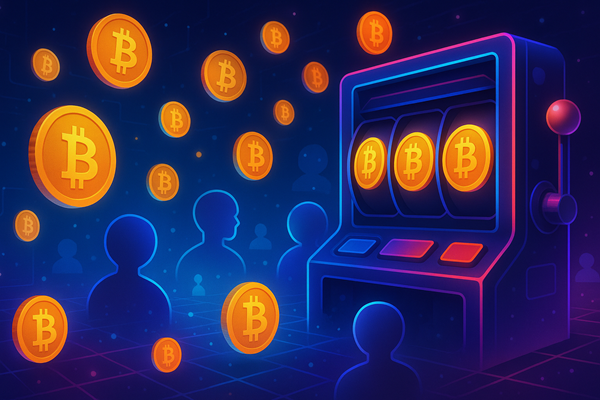The rise of Bitcoin has reshaped not only financial systems but also sparked innovation across a wide array of digital industries. As blockchain technology matures, its influence is increasingly evident in entertainment platforms that cater to global audiences, eliminating the need for physical infrastructure. From decentralized finance (DeFi) applications to virtual gaming environments, Bitcoin is quietly driving a new wave of digitally native experiences.
One of the most visible areas of growth is within digital-only entertainment, where user interaction, ownership models, and reward systems are being redefined by token-based design. Platforms inspired by blockchain principles, such as Highroller, a top-tier social slot experience are demonstrating how elements pioneered by cryptocurrencies can translate into mainstream consumer engagement without involving real financial risk.
Bitcoin as a Foundation for Decentralized Ecosystems
Bitcoin introduced the world to the concept of a decentralized value system—one that doesn’t rely on a central authority to validate transactions or ownership. This core idea has been foundational in reshaping how digital platforms approach trust, transparency, and user autonomy.
In traditional entertainment ecosystems, users often have limited control over their digital assets or progress. With blockchain-based models inspired by Bitcoin’s structure, systems can be created where value is transparent, verifiable, and owned by the user.
This architecture is shaping the next generation of entertainment platforms, which prioritize user control and decentralized asset management. These platforms aren’t always built directly on Bitcoin, but they frequently adopt design principles that Bitcoin helped introduce.
Reward Mechanics and Tokenized Engagement
Digital entertainment platforms, particularly social gaming ecosystems, have increasingly adopted reward mechanics that mimic token-based economies. Bitcoin’s transparent and auditable ledger system is a natural fit for environments that rely on trackable user interaction.
Users today expect more than passive content—they want engagement. Token-style systems help fulfill this need by offering users digital coins, collectibles, or status rewards in return for activity and interaction. These systems are not cryptocurrencies in the traditional sense, but they reflect the same demand for transparency, value, and control that Bitcoin made popular.
Social casino platforms, such as Highroller, utilize these design elements to create rich, immersive environments where players accumulate coins and unlock features through active participation. Although no real monetary exchange is involved, the satisfaction of progress and achievement in a coin-based system offers a compelling substitute for traditional value transfer.
Digital Identity and Ownership in Blockchain-Inspired Worlds
One of the most profound impacts of Bitcoin is the idea that digital identity and ownership can exist without centralized approval. This has opened the door for decentralized identity management and asset ownership across entertainment platforms.
In blockchain-based gaming, for example, users may hold unique items or access tokens in a secure wallet. This system of verifiable ownership is gaining traction even in non-blockchain environments. Social platforms and digital entertainment hubs are adopting models where users “own” their progress or in-game assets—even if that ownership is symbolic rather than cryptographic.
The success of these systems highlights a broader trend: the integration of decentralized technology with mainstream entertainment formats. Platforms are learning from Bitcoin’s core mechanics to design better user experiences, where value and achievement are tracked transparently.
The Growing Infrastructure for Crypto-Driven Entertainment
Behind the scenes, the infrastructure supporting Bitcoin and other blockchain protocols is creating new possibilities for digital entertainment. Lightning Network advancements, layer-2 scalability solutions, and cross-chain interoperability are expanding the applications of blockchain beyond finance.
For developers of entertainment platforms, this means the potential to embed blockchain-backed reward systems, verifiable scarcity models, and seamless user authentication. These tools aren’t just theoretical, but they’re being actively explored to create smarter, more engaging platforms that cater to digitally native users.
A recent study by the MIT Digital Currency Initiative outlines how blockchain protocols like Bitcoin are enabling new modes of interaction, including those within digital environments. The research emphasizes how verifiable computation and decentralized consensus can add layers of trust to traditionally opaque systems—something entertainment platforms are increasingly interested in.
Platform Neutrality and Global Reach
One of Bitcoin’s most powerful attributes is its platform neutrality. It works the same way whether accessed from a mobile device in Asia or a desktop computer in Europe. This global accessibility aligns with the goals of modern entertainment platforms: to reach a broad audience without platform restrictions.
Digital-only entertainment systems benefit from these principles, adopting universal frameworks that don’t rely on regional payment processors, ID verification, or local infrastructure. This makes them especially attractive to users in underbanked regions or those who prefer digital anonymity and mobility.
This design freedom allows entertainment creators to focus more on user experience and less on legacy system constraints. Many of the same advantages that Bitcoin brings to finance, reduced friction, global access, and decentralized control, are now being leveraged in entertainment to deliver inclusive, user-first platforms.
Looking Ahead: Where Bitcoin-Inspired Design Is Heading
As Bitcoin continues to evolve, its indirect impact on entertainment will likely deepen. We’re already seeing how token-based mechanics, decentralized control, and global interoperability are shaping new types of engagement models.
Social entertainment and gaming platforms are early adopters of these principles, not necessarily by integrating cryptocurrency, but by building systems that feel familiar to a crypto-native user base. These platforms don’t need to be financial to benefit from what Bitcoin has introduced.
The future may bring more direct integrations, such as blockchain-secured achievements, wallet-based user identity, or smart contract-based interactions. But even now, Bitcoin’s fingerprint is clearly visible in the mechanics, structure, and philosophy of emerging entertainment technologies.


